In the Bible, the ocean is a multifaceted symbol. It represents both the greatness and mystery of God’s creation and the chaos that humankind often faces. The ocean is portrayed as a source of both judgment and salvation, a realm of destruction but also of deliverance. This duality makes the ocean one of the most powerful and profound natural symbols in the Bible. Read Bible Stories About the Ocean.
In biblical times, the ocean was largely seen as a boundary—both physical and spiritual. People believed that it was a place beyond human control, a chaotic and untamable force that could overwhelm those who ventured into its depths. It’s no surprise, then, that the ocean frequently appears in biblical stories as a representation of God’s power and a testing ground for faith.
The Ocean in Creation: Genesis and God’s Work
The story of creation in the book of Genesis (Genesis 1:1-10) presents the ocean as a vital element in the formation of the world. God begins by creating the heavens and the earth, and the earth was “formless and empty, darkness was over the surface of the deep.” The “deep” here refers to the primeval ocean, a watery chaos that existed before God’s intervention.
God’s first act of creation was to bring light into the darkness, separating it from the waters. In Genesis 1:6-7, God said, “Let there be a vault between the waters to separate water from water.” This separation was the creation of the sky, which divided the waters above from the waters below. The ocean is thus presented as a key element in the Genesis creation narrative, playing a role in the establishment of order from chaos.
Key Takeaways:
The ocean is central to the creation narrative, symbolizing the primal chaos that God orders.
The act of separating waters reflects God’s power to bring order and structure to the universe.
Read Also: Bible Verses About Ocean
Noah’s Ark: The Great Flood and the Ocean’s Role
One of the most famous Bible stories involving the ocean is the account of Noah’s Ark (Genesis 6-9). In this story, God instructs Noah to build an ark to save his family and pairs of animals from the coming flood, a deluge that would cover the earth and cleanse it of corruption.
The ocean, in this context, becomes a symbol of both divine judgment and salvation. The floodwaters are sent by God as a means of purging the world of evil, but they also serve to cleanse and renew creation. The ark, a vessel of salvation, floats upon the ocean’s waters, preserving life amidst destruction.
Key Bible Verses:
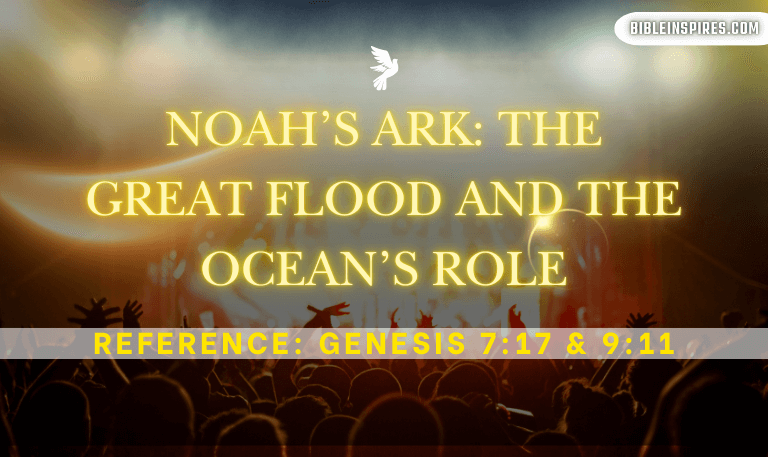
Genesis 7:17: “For forty days the flood kept coming on the earth, and as the waters increased, they lifted the ark high above the earth.”
Genesis 9:11: “I establish my covenant with you: Never again will all life be destroyed by the waters of a flood, never again will there be a flood to destroy the earth.”
Key Takeaways:
The ocean symbolizes divine judgment through the flood.
The ark represents salvation and God’s mercy amidst destruction.
Moses and the Red Sea: A Barrier Divided
The story of Moses and the Israelites crossing the Red Sea (Exodus 14) is another powerful biblical narrative involving the ocean. In this story, Moses leads the Israelites out of slavery in Egypt, and they are pursued by Pharaoh’s army. With the sea in front of them and the enemy behind, the Israelites are trapped. However, God instructs Moses to stretch his hand over the sea, and the waters part, creating a dry path for the Israelites to cross.
This miraculous event is not only a demonstration of God’s power but also a profound act of deliverance and salvation. The Red Sea here represents a barrier that God overcomes to deliver His people, showing that no obstacle, no matter how great, is beyond His control.
Key Bible Verses:
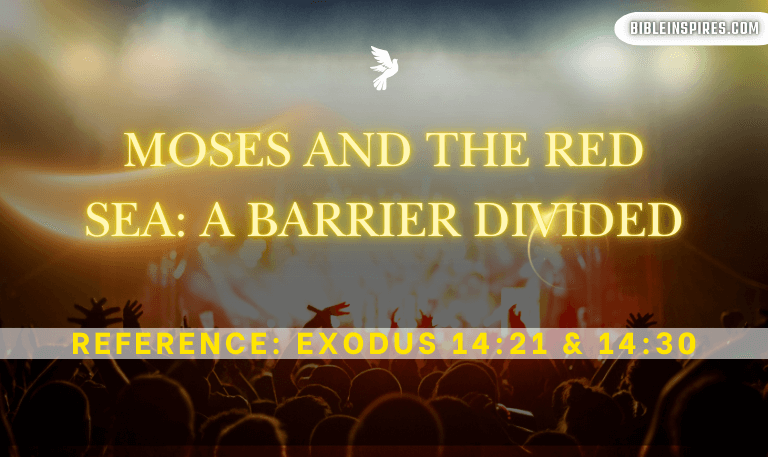
Exodus 14:21: “Then Moses stretched out his hand over the sea, and all that night the Lord drove the sea back with a strong east wind and turned it into dry land.”
Exodus 14:30: “That day the Lord saved Israel from the hands of the Egyptians, and Israel saw the Egyptians lying dead on the shore.”
Key Takeaways:
The Red Sea represents an insurmountable obstacle that God uses to demonstrate His power.
The parting of the Red Sea symbolizes the deliverance of God’s people from oppression.
Read Also: Bible Verses About Peace and Ocean
Jonah and the Whale: Disobedience and Redemption
The story of Jonah (Jonah 1-2) is one of the most well-known Bible stories involving the ocean. Jonah, a prophet, is commanded by God to go to the city of Nineveh and call its people to repentance. Instead, Jonah tries to flee by sailing to Tarshish, but a great storm arises. Jonah is thrown into the ocean to calm the storm, and he is swallowed by a giant fish (often called a whale).
Jonah’s time in the ocean and the belly of the fish is a period of reflection, repentance, and redemption. The ocean in Jonah’s story symbolizes both punishment for his disobedience and a place of spiritual renewal. It is within the depths of the sea that Jonah prays to God and finds salvation, ultimately fulfilling God’s mission to Nineveh.
Key Bible Verses:
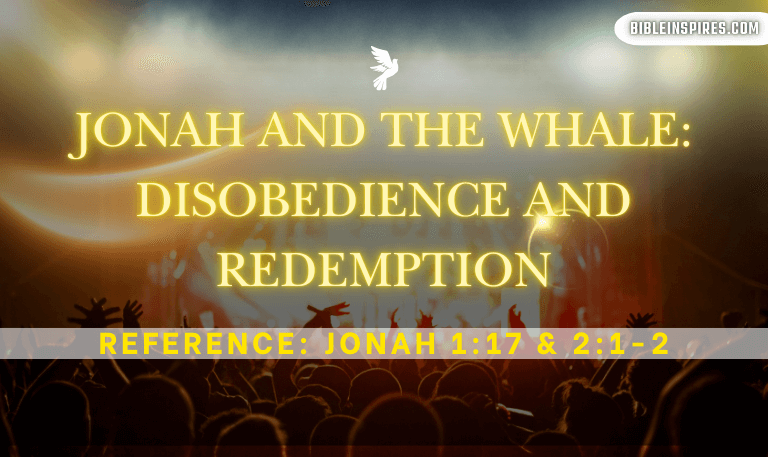
Jonah 1:17: “Now the Lord provided a huge fish to swallow Jonah, and Jonah was in the belly of the fish three days and three nights.”
Jonah 2:1-2: “From inside the fish Jonah prayed to the Lord his God. He said: ‘In my distress I called to the Lord, and he answered me.'”
Key Takeaways:
The ocean serves as both a place of punishment and redemption for Jonah.
Jonah’s story is a powerful example of God’s mercy and the importance of obedience.
Jesus Calms the Storm: Faith in the Midst of Chaos
In the Gospels, one of the most dramatic encounters between Jesus and the ocean occurs when Jesus calms a violent storm on the Sea of Galilee. In Matthew 8:23-27, Jesus and His disciples are caught in a fierce storm while crossing the sea. The disciples, terrified, wake Jesus, and He rebukes the storm, saying, “Quiet! Be still!” The storm immediately ceases, and the disciples are amazed.
This story highlights the ocean’s role as a symbol of chaos and fear. Jesus’ command over the storm illustrates His divine authority and the importance of faith during difficult times. The ocean, in this case, represents life’s trials, and Jesus’ calm presence offers peace amid turmoil.
Key Bible Verses:
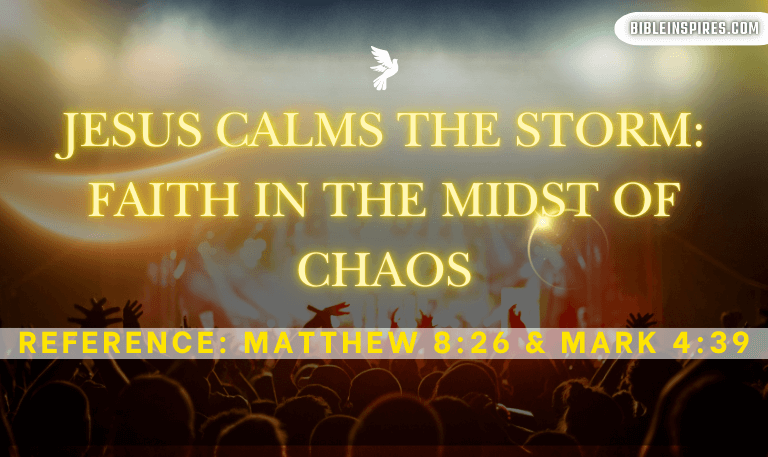
Matthew 8:26: “He replied, ‘You of little faith, why are you so afraid?’ Then he got up and rebuked the winds and the waves, and it was completely calm.”
Mark 4:39: “He got up, rebuked the wind and said to the waves, ‘Quiet! Be still!'”
Key Takeaways:
The ocean represents life’s turmoil and challenges.
Jesus’ power over the storm demonstrates His divine control and the importance of faith in overcoming adversity.
Read Also: Symbolism of the Ocean in Bible
The Sea of Galilee: The Ocean’s Presence in Jesus’ Ministry
While the Sea of Galilee is technically a lake, it plays a significant role in Jesus’ ministry. Many of His miracles and teachings took place around this body of water. The Sea of Galilee, surrounded by mountains and offering sustenance to the people, becomes a place of divine revelation and service.
Key Bible Stories Involving the Sea of Galilee:
Jesus Walks on Water: In Matthew 14:22-33, Jesus walks on water to reach His disciples, showing His mastery over nature and reinforcing His divine identity.
Peter’s Faith: Peter steps out of the boat to walk on water but begins to sink when his faith wavers. This event teaches the importance of unwavering faith.
Key Takeaways:
The Sea of Galilee serves as a backdrop for numerous miracles, emphasizing Jesus’ divine authority and the need for strong faith.
The Ocean as a Metaphor for Spiritual Journeys
In many ways, the ocean serves as a metaphor for spiritual journeys. Just as the ocean is vast, mysterious, and unpredictable, so too are the paths of faith. In biblical stories, characters frequently find themselves on the ocean’s waters, facing challenges that test their faith and resolve. These stories teach us that faith is often built through trials and that God’s presence is with us through both calm and storm.
Read Also: Pray Daily for Long Life
Lessons from Biblical Ocean Stories
The Bible stories about the ocean are filled with powerful lessons. From Noah’s faith in the midst of the flood to Jonah’s redemption from the belly of the fish, each story reveals truths about God’s nature and our spiritual journey. Whether it’s the importance of obedience, trust in divine providence, or the promise of deliverance from life’s storms, these stories provide timeless wisdom.
Bible Stories About the Ocean FAQ
Q1: What does the ocean symbolize in the Bible?
A1: The ocean symbolizes chaos, judgment, and God’s power. It is also a place of salvation and deliverance, as seen in stories like Noah’s Ark and Moses parting the Red Sea.
Q2: Why did God send the flood in Noah’s story?
A2: God sent the flood to cleanse the earth of its wickedness, offering a fresh start for creation and a demonstration of His judgment and mercy.
Q3: What is the significance of Jesus calming the storm?
A3: The story of Jesus calming the storm illustrates His authority over nature and serves as a lesson about faith. Even in life’s most chaotic moments, God’s power brings peace.
Conclusion
The ocean in biblical stories represents far more than just a physical body of water. It is a powerful symbol of God’s sovereignty, the challenges of life, and the ultimate peace that comes through faith. By examining these stories—Noah’s Ark, Moses and the Red Sea, Jonah’s journey, and Jesus calming the storm—we see that the ocean teaches us essential lessons about faith, redemption, and God’s eternal presence in our lives.
Whether it’s the chaotic waves or the calm seas, the ocean in the Bible is a constant reminder of God’s control over creation and the importance of trusting in Him through life’s storms.
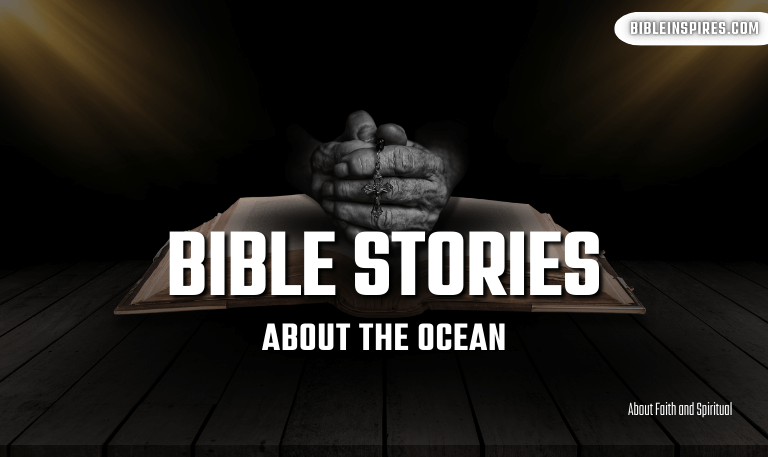


![10 Bible Verses That Sound Made Up [2025 Guide] 17 10-Bible-Verses-That-Sound-Made-Up-[2025-Guide]](https://bibleinspires.com/wp-content/uploads/2025/04/10-Bible-Verses-That-Sound-Made-Up-2025-Guide.png)